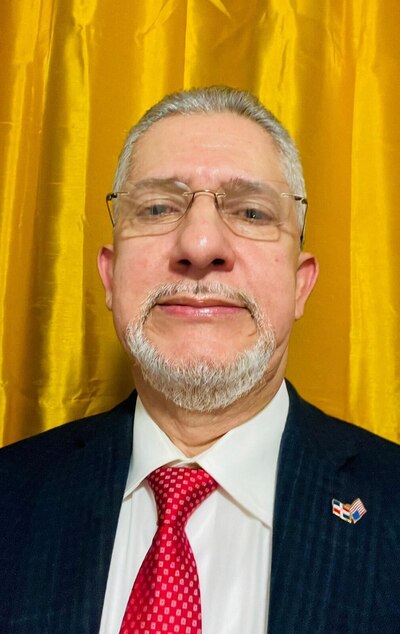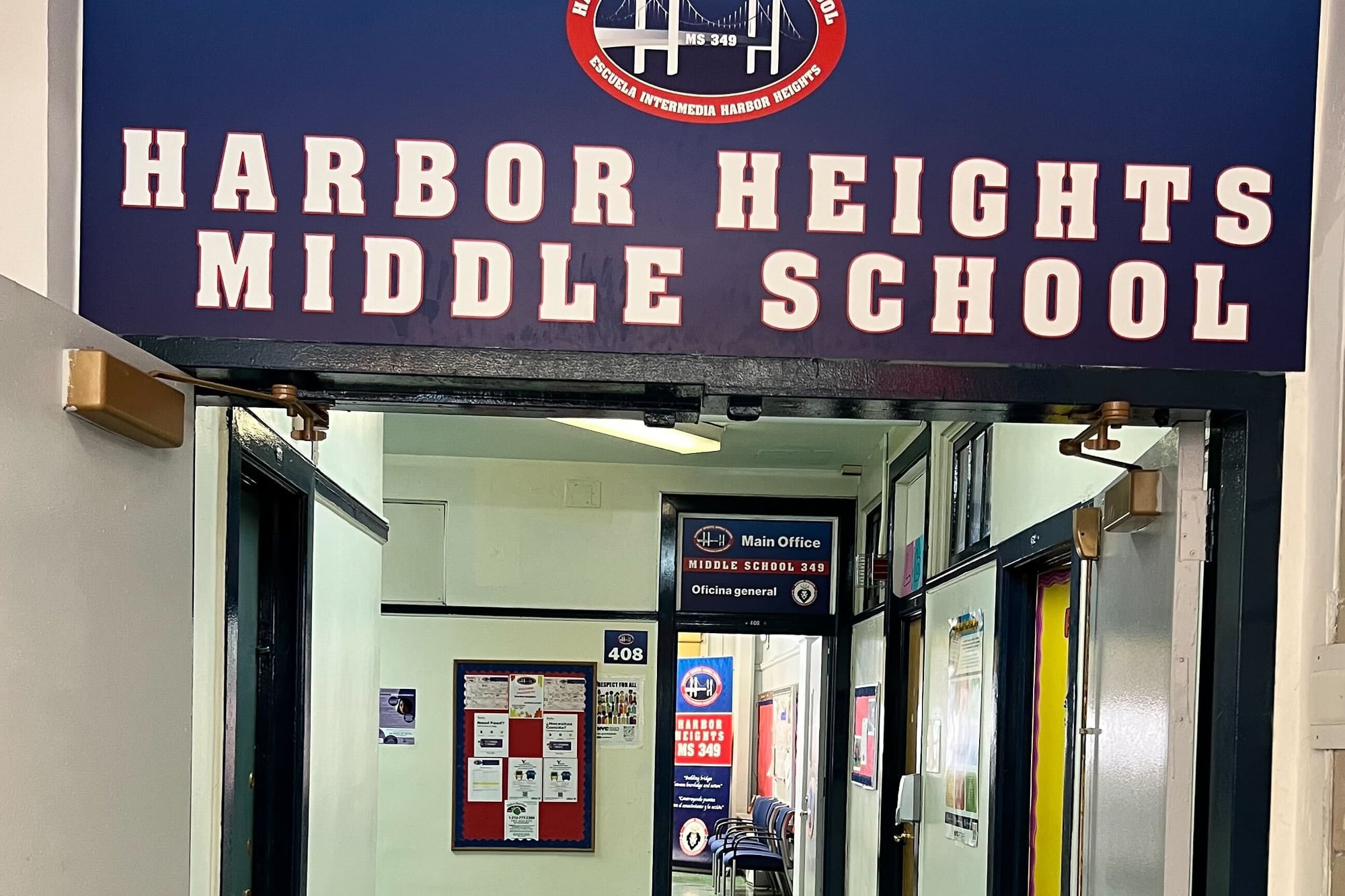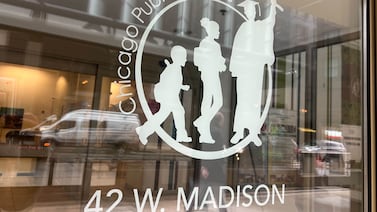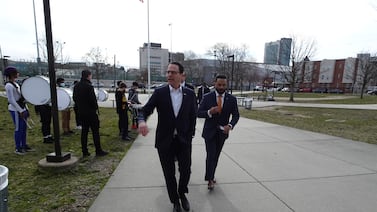When Jorge Gomez’s son arrived in New York City four years ago from the Dominican Republic, he languished in his first public school — struggling to learn the language and make friends, and sinking into a depression that frightened his parents.
His spirits improved with remarkable speed after he enrolled at Harbor Heights, a small public middle school in Washington Heights geared toward helping new immigrants acclimate, where all the staff speak Spanish and are trained to support immigrant families, and where 90% of students are learning English.
“Practically within a week of being there, the boy went back to being the way he was,” said Gomez. “Harbor Heights is an oasis in the middle of the desert for all of those Spanish-speaking children who arrive to a different system and a different language.”
But the school, which had just over 100 students before the pandemic, dropped to an enrollment of around 60 students this year, prompting the education department to propose a merger with P.S. 173, the much larger elementary school in the same building.
Education department officials argue that Harbor Heights has become too small to be viable and offer the necessary variety of extracurricular and academic offerings, since schools are funded largely on a per-student basis. They contend that the school’s core features — especially its transitional bilingual program for newly arrived immigrant students — will continue on after the merger, and that current Harbor Heights students will get the benefits of being part of a larger school with more resources. P.S. 173 has 415 students, according to the education department.
But some Harbor Heights parents are fiercely opposed to the merger, and argue that what makes the school special will be lost when the schools join.
“Having a school with Spanish-speaking teachers and principal, it’s extremely important,” said Crystaly Tejada, the parent of a sixth grader at Harbor Heights and vice president of the parent association, who launched a petition opposing the merger. “You’re taking away what they know and love.”
Parents opposed to the merger argue that the kind of welcoming environment for new immigrants that Harbor Heights has fostered is particularly valuable as the city welcomes an influx of asylum-seeking youth from Latin America, and as officials point to an ongoing citywide shortage of bilingual programs and educators. Rafael Liriano, the president of the parent association, said the school has welcomed more than 20 asylum seekers since the beginning of the school year. An education department spokesperson could not confirm that figure, saying the agency doesn’t track students’ countries of origin.

Liriano said Harbor Heights could have enrolled and benefited even more asylum-seeking students with better marketing of the school.
“They didn’t do their job of knocking on the doors,” Liriano said. “How are these kids going to know? No one informed them. They’re suffering.”
Pressure on small schools mounts as enrollment drops
The fight over the Harbor Heights merger may be a preview of battles to come as city officials face mounting pressure to deal with a growing number of undersubscribed schools in the wake of steep enrollment declines during the pandemic.
The city’s public school system ended last school year with 201 schools of under 200 students, up from 99 such schools in 2007, according to education department figures.
Small schools are more difficult and expensive for the city education department to maintain and often struggle to provide robust extracurricular and academic offerings. City officials padded schools’ per-pupil funding during the pandemic with one-time federal COVID relief money, but started to taper off that support this school year.
The Harbor Heights merger, which is supposed to go up for a vote Wednesday before the city’s Panel for Educational Policy, is the first such proposal this school year.
Another proposed merger of West Side Collaborative and Lafayette Academy middle schools on the Upper West Side hasn’t been officially submitted to the Panel for Educational Policy yet, but is already drawing fierce pushback from some West Side Collaborative families, according to parents.
Officials argue that mergers are often preferable to outright closures and can bring benefits to both schools, including fostering racial and socioeconomic integration when schools with different demographic profiles are joined. (Both schools in the Harbor Heights merger are almost entirely Latino and largely low-income, though Harbor Heights has a higher proportion of English language learners.)
But in practice, joining two schools can feel like a closure for the smaller school. The larger school often ends up keeping its name and principal, and pedagogical approaches and school cultures can clash.
Gomez, the Harbor Heights parent, said he fears his school will “disappear” after the merger.
Harbor Heights families say they’re particularly concerned about losing their principal, Tammy Nin, whom they credit with helping to build the welcoming environment at the school. An education department spokesperson said Nin will have a “leadership role” elsewhere in the district.
One former staffer at Harbor Heights pointed out that the enrollment issues are longstanding, and argued that joining with P.S. 173 — which also serves a similar community — is a much better prospect than closure.
“We struggled for years to market the school to the target population, but due to forces outside our control, families couldn’t send their kids to Harbor Heights,” said the former teacher, who spoke on the condition of anonymity because they weren’t authorized to speak. “I think this is a great way to save the school instead of closing it altogether.”
NYC officials point to potential benefits
In a Feb. 9 note to Harbor Heights families, District 6 Superintendent Manuel Ramirez emphasized that the transitional bilingual education program that’s the hallmark of the middle school will continue on in the merged school. He added that the bilingual program “will also benefit from additional resources that will become available as part of a larger school so it can better serve current and future students in the program.”
An education department spokesperson said that Harbor Heights has, up to now, been able to sustain its extracurricular programs and other offerings even as enrollment dropped because of federal relief money, but warned that money is running out.
Ramirez was scheduled to meet with Harbor Heights families again on Tuesday night in advance of Wednesday’s Panel for Educational Policy vote.
For Gomez, whose son found a refuge in Harbor Heights after bruising experiences in another school, the fight isn’t over.
“Kids who come from Spanish-speaking countries find an environment where they can make a transition without trauma, they can make a clean, healthy transition,” he said. “I’m ready to fight to the end, talk to whoever I need to talk to so that this doesn’t happen.”
Michael Elsen-Rooney is a reporter for Chalkbeat New York, covering NYC public schools. Contact Michael at melsen-rooney@chalkbeat.org.







